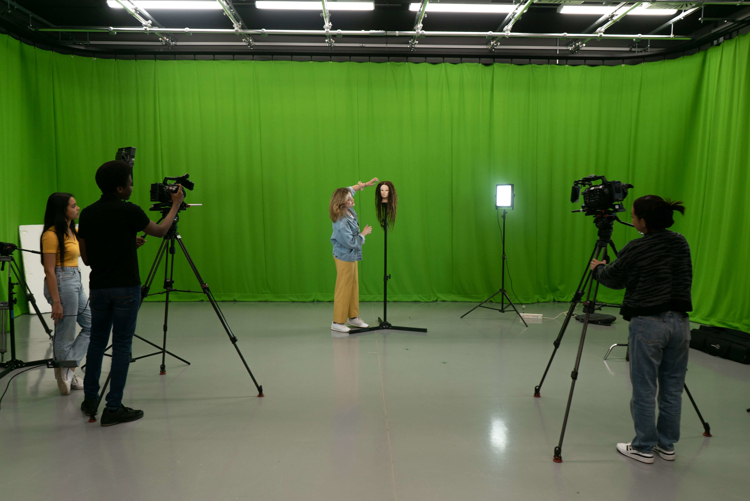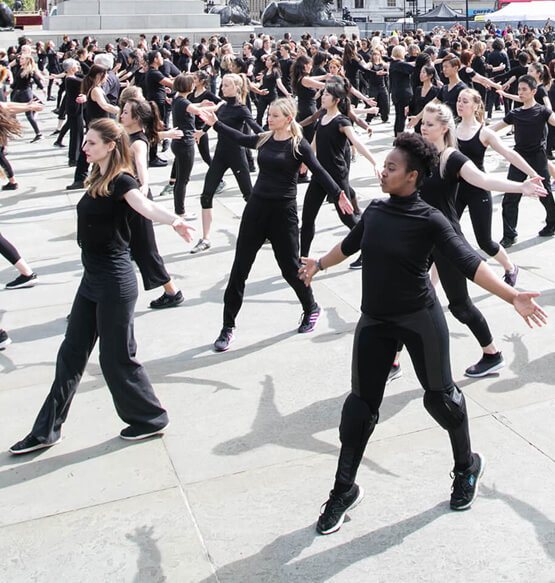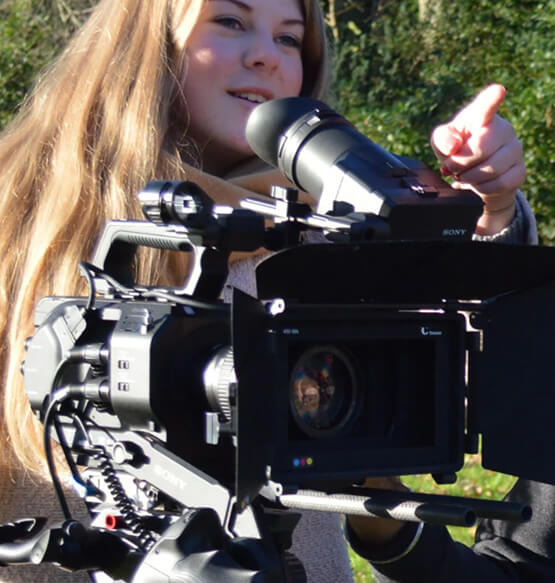You'll need:
112–128 UCAS points (or equivalent)
Foundation Year: 64–80 UCAS points (or equivalent)
International Foundation Pathway:
64 UCAS (or equivalent)
IELTS: 5.5
UCAS Code:
W620
W650 (If choosing Foundation Year)
Start date(s):
September 2026
Make a start as a creative storyteller producing audio-visual content, as well as fiction and documentary films.
Our course will give you the skills and confidence to succeed as a professional in the arts and media industries. We are ranked in the top 3 universities in London for Film (Guardian University Guide 2024).
Top 6 in London for Film
(Complete University Guide 2025)

Join an accredited course
International Moving Image Society (IMIS)
This programme holds accreditation from the International Moving Image Society (IMIS), a globally recognised organisation dedicated to promoting excellence and professionalism in film, television, and digital media industries. IMIS accreditation assures that our curriculum meets high industry standards, equipping students with relevant skills and knowledge that align with current professional practices.
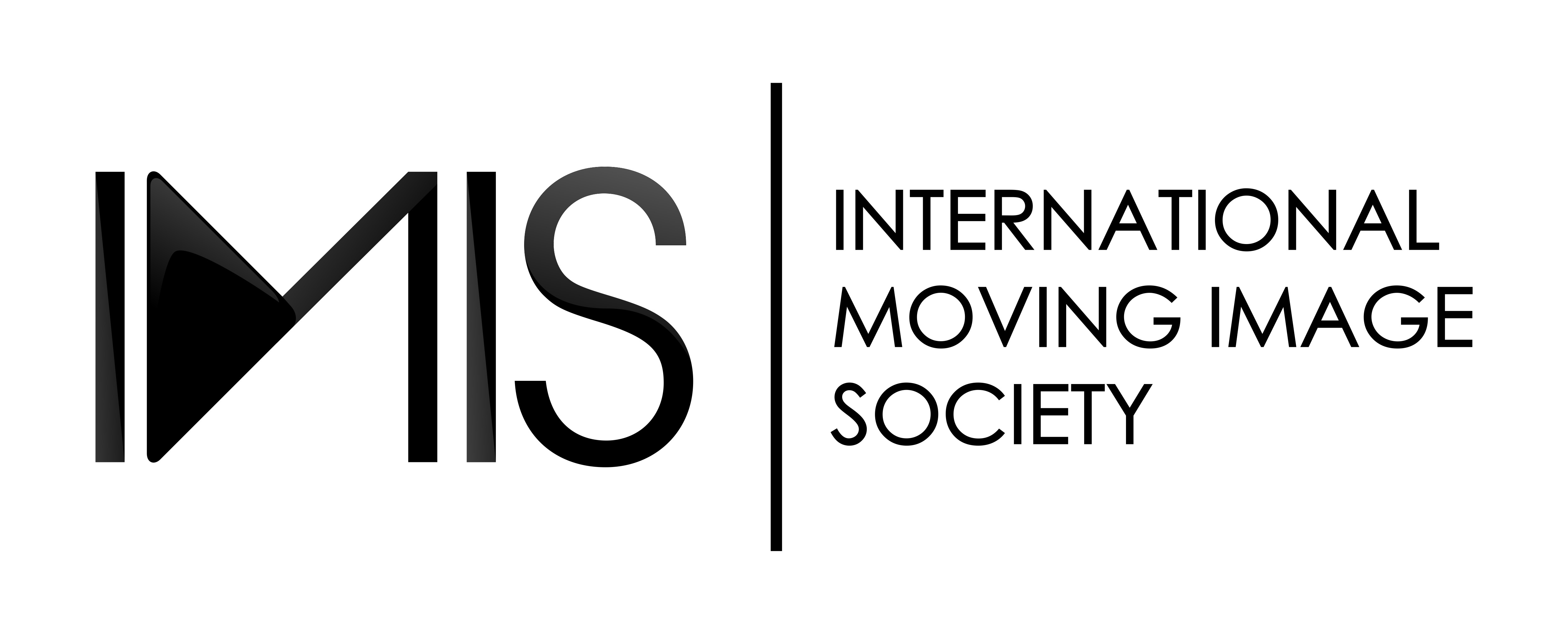
Educational Partnership with BAFTA albert
You’ll have the opportunity to become an ‘albert grad’ and receive a professional qualification in sustainable filmmaking, a growth area in film and TV productions which now increasingly demand environmental certifications towards a greener world.
albert is the leading screen industry organisation for environmental sustainability, it is owned by BAFTA, and support the Film and TV industry to reduce the environmental impacts of production and to create content that supports a vision for a sustainable future.
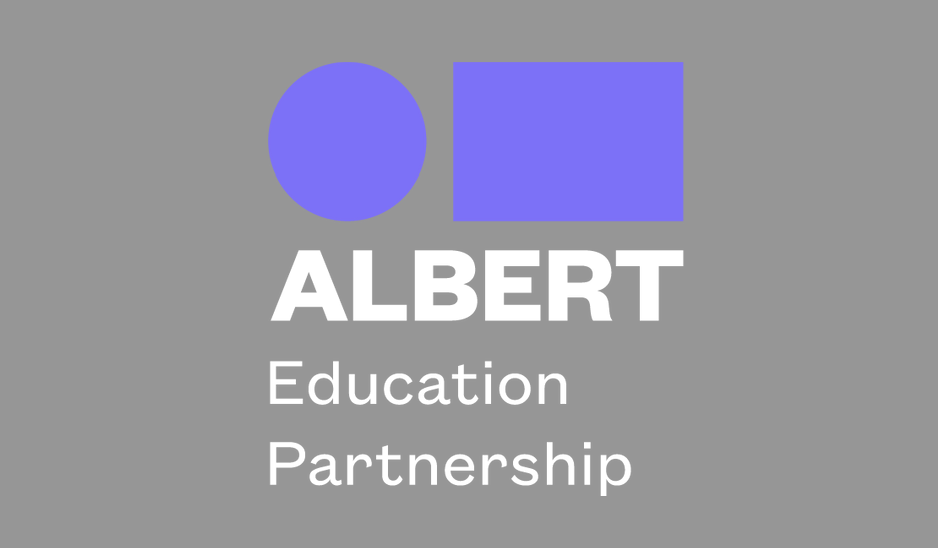
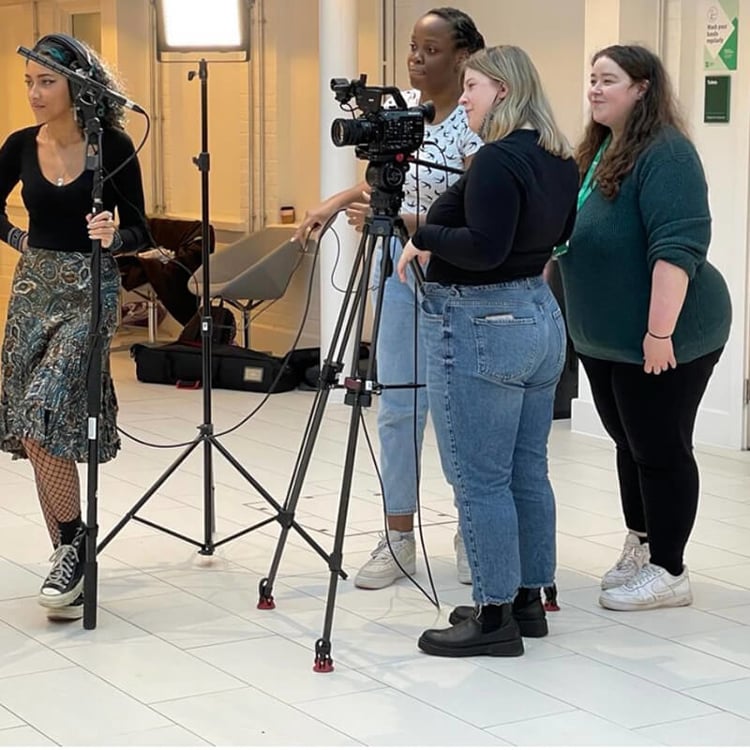
You will be immersed in the world of creative filmmaking right from the start.
At Roehampton, you'll refine your skills in:
- Identifying imaginative concepts
- Developing and crafting diverse audio-visual content
- Creating ambitious drama and documentary films
You will delve deep into the fabric of the UK film and screen industries, navigating a dynamic blend of hands-on film production and cutting-edge theories underpinning contemporary visual media.
You will study in a unique situation: the Roehampton campus is situated on the doorstep of London’s world-beating media industries, but also offers a safe, convenient range of woodland, lakeside, period, and modern urban settings as locations for your film projects.
Create cinematic masterpieces alongside dedicated staff
Check out our showreel here, featuring highlights from the final-year films created in 2023/24. It offers a glimpse into the style and quality of our graduation projects.
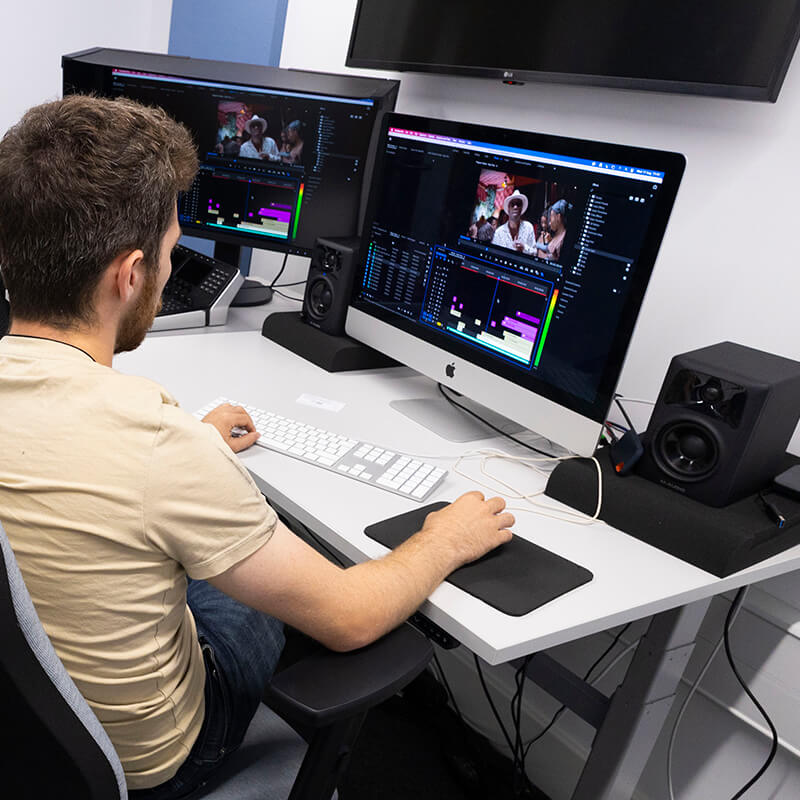
Industry Professionals
This course is taught by recognised, working industry professionals, whose productions include BIFA and BAFTA-nominated fiction and documentary films screened in competition at top festivals (Tribeca, Edinburgh, London, Sheffield, and Cannes/ACID), broadcast on BBC, ITV, Channel 4 and Artem, and distributed in over 120 territories.
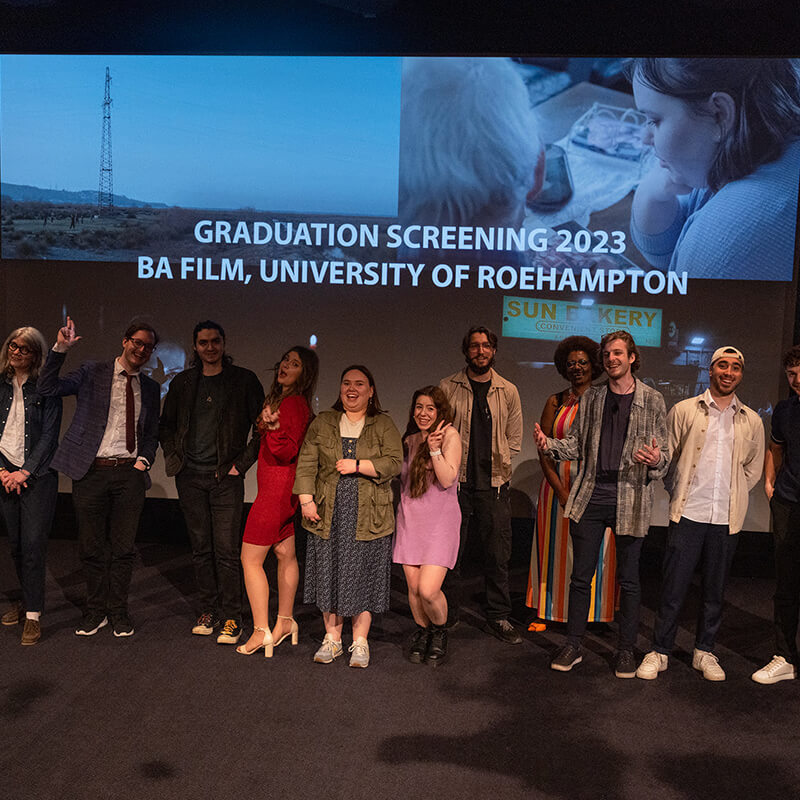
Innovate
Our tutors also publish innovative film books with BFI, Routledge, and other leading publishers, and their writing appears regularly in The Guardian, Sight & Sound, Granta, and more.
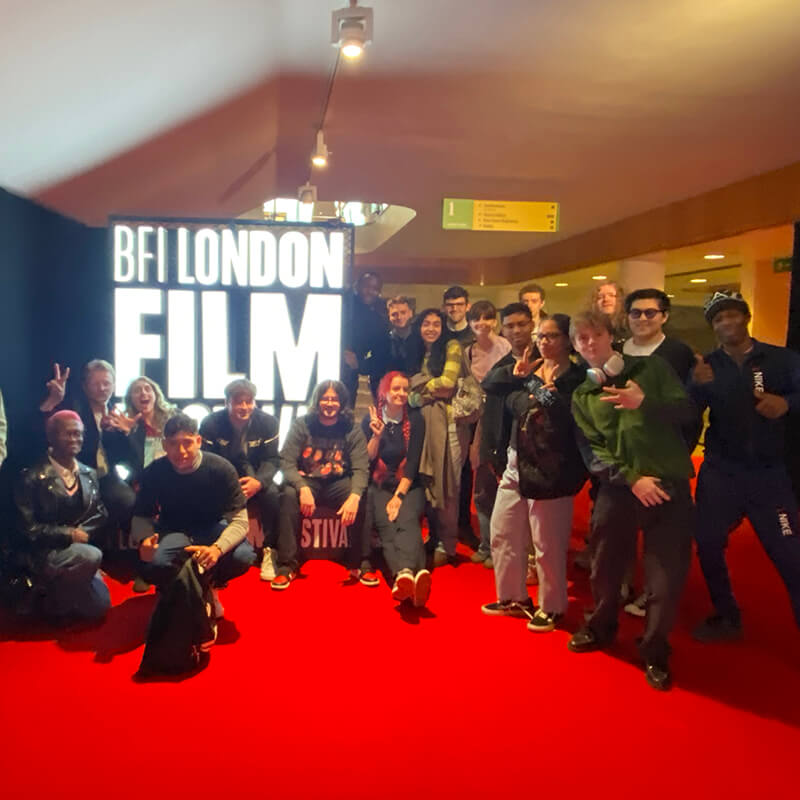
Real-world Opportunities
Our strong industry links ensure students also benefit from visiting workshops and tutorials with top professionals in the global film industry such as Cannes-winning directors and Oscar-winning composers, commissioners, and funders like Netflix and the BFI.
Modules
Module overview:
This module introduces you to the key process of depicting characters and scenarios on screen through developing and producing a short non-fiction project. The basic building blocks of characterisation and film language are delivered through screening and analysis of key works in seminars, hand-on exercises in creative development, and the practical implementation of technical skills in additional to training sessions.
You are equipped to explore a range of practical and conceptual methods to develop your characters and storylines on screen, such as observation, interview and participation and the knowledge to direct and reflect on their own film production.
You are encouraged to recognise the implications and ethics of timeframes, subject matter, cultural context, and different and varied documentary practices and approaches.
You are guided and supported in developing your creative voices and style as practitioners, and a final screening encourages you to view and represent your work in relation to a diverse cohort.
How you'll learn:
You'll learn through weekly seminars that will cover theories on non-fictional films and film analysis, project discussions and pitching works. There will also be technical workshops that will consist on specific and essential training.
There will be an additional 30 minutes of asynchronous digital support per week. This will consist of tasks to be done following clear instructions (film review, reading, online tutorials etc.)
Module overview:
This module provides you with an in-depth introduction to film language through the study of a wide range of films (drama, non-fiction, animation, short and feature-length) spanning different eras and geographical regions. Through selected case studies, you will encounter varied modes of production, technologies and contexts of exhibition and reception, including through a field trip to a key festival such as the London Film Festival. You will explore key aspects of filmmaking, such as cinematography, sound, editing, mise en scène and performance, together with theories of narration, authorship and genre.
The module provides you with an understanding of how each element of a film’s construction contributes to the ways audiences understand and interpret it. Their skills in close analysis are developed through a variety of classroom exercises, including the hands-on practical analysis of case studies through the use of Adobe Premiere Pro. By training students to view and examine films critically, including with digital editing software, the module provides students with a firm basis for your onward journey to becoming thoughtful, self-reflective practitioners.
How you'll learn:
You'll learn through weekly seminars and workshops, these will include in-class discussion, workshops devoted to preparing you for assessment, film screenings accompanied my active viewing worksheets, comparative audiovisual textual analysis exercises, and dedicated digital editing training workshops. One week will be devoted to experiential learning in the form of a field trip. There will also be an additional 30 minutes of asynchronous digital support per week. This will consist of prescribed readings and viewings. Formative feedback will be built in via in-class exercises where we undertake work-in-progress activities and sample assessment material, while you will also have the opportunity for tutorials on your case study selection.
Module overview:
This module is mainly taught by practitioners and builds on term one practical and storytelling skills to gain a more in-depth working knowledge of camera, lighting and sound design. You will work collaboratively to produce a cinematic example of subjective representation according to a brief (such as ‘a moment of tension’), produced in two parts focusing first on camera and lighting, and secondly on sound design. The camera and sound workshops will be delivered in small groups of in the studios, to allow for full attention to your work at this early stage of your practical learning. You will be introduced to camera controls and set up, camera movement, framing, composition, basic lighting techniques and colour temperature, as well as sound recording, foley techniques and sound design using specific sound design software such as Audition. Alongside the practical teaching, you will learn about and analyse the use of audio and visual relationships in storytelling, as well as explore significant and varied film case studies, which will help them to contextualise their work and develop their creative voices.
How you'll learn:
You'll learn through weekly seminars and workshops. The seminars will cover contextualisation and analysis of cinematography and sound design, while the workshops will consist of practical exercises in cinematography and sound design techniques.
There will be an additional 30 minutes of asynchronous digital support per week. This will consist of online tutorials reinforcing technical learning, as well as reading and viewing material supporting the preparation for the accompanying written assessment.
Module overview:
This module introduces you to the key areas or ‘building blocks’ of fiction storytelling for the screen. You will work in groups and be part of a film crew to prepare, film and deliver a key scene or a short drama. Conceptual and critical discussion of fiction film form with a diverse, global range of texts and case studies will ground your first efforts in selecting, justifying and executing a coherent aesthetic plan appropriate to a given film narrative, using developmental and preparatory documentation like references, storyboards and floorplans. You will take turns covering key roles (producer, cinematographer, sound designer, editor, director) and doing so, you will learn industry crewing practice, be introduced to medium-size group work and its demands and come to understand best practice workflow. Principles of visual storytelling, ideas of genre and audience reception including popular film culture and contemporary genres, will all be covered as a matter of course integrated into the development and preparation for the shoot and post-production period. Critically for a practical course with accreditation, teaching will be buttressed by separate technical training supporting essential skills in camera, lighting, sound and sound post, and editing.
How you'll learn:
You'll learn through seminars, workshops, and active learning each week, excepting the two shoot weeks which will consist of on-the-ground film production.
Learning modes will include screenings and analysis of key works, seminars, workshops, studio practice, group work on a film set, and technical training.
There will be an additional 30 minutes of asynchronous digital support per week. This will consist of online tutorials reinforcing technical learning, as well as reading and viewing material supporting the preparation for the accompanying written aspects of assessment.
These are the current planned modules on this course and may be subject to change.
Module overview:
This module will give you an opportunity for hands-on experience in the logistical, financial, creative, and people management aspects of the film making process. You will be introduced to the roles in producing and learn that whilst every film involves a series of routine processes, each film is also unique, with its own set of challenges to overcome. Activities will include understanding and answering a professional and real documentary funding opportunity, developing an idea and a synopsis, a creative statement, and put together a confident and engaging demo (including all required production paperwork).You will also develop and complete a production folder following industry requirements working towards the BFI funding scheme BFI NETWORK England short fiction film funding. You will work from an actual script and will be guided to write a director statement, produce a script breakdown, a financial structure as well as a budget, a mood board and team bios. You will also be introduced to the industry requirements in terms of inclusivity and environmental sustainability, and you will have the opportunity to gain your BAFTA albert professional certification.
How you’ll learn:
You’ll learn through a weekly seminar, combining lectures, workshops, hands-on exercises, group work, and professional skills development. You’ll also get 30 minutes of weekly asynchronous support with readings, videos, and online tutorials to build your technical skills.
Module overview:
You will form a variety of industry-model crews and collaborate to locate, research and explore the representation of real subject matter; to deliver a creative, innovative and accomplished 8-10 minute non-fiction film. With the aim of developing narrative and portraying characterisation, you will apply an informed selection of methodologies in relation to subject matter and use increasingly sophisticated cinematic film language to achieve a rigorous and considered piece of work. This requires the ability to analyse and articulate the relationship between filmmaker, subject and approach, as well as an understanding of historical traditions and contemporary approaches, including the modes of documentary; personal, poetical and lyrical styles; political documentary; hybridity; verbatim documentary; use of archive; observation and visual subtext; feminist documentary; and re-enactment. Particular attention is given to critical analysis and practical application of a range of interview and storytelling techniques, from stylised to informal; alongside discussions of ethics, representation, diversity and inclusion. Lectures, screenings and workshops are designed to cover historical, global and cutting-edge trends, with reference to commissioning; emerging technologies; and funding, screening, distribution and exhibition sites and opportunities. Critically for a practical course with accreditation, teaching will be supported by separate high-level, intensive and hands-on technical skills training.
How you’ll learn:
You’ll learn through a weekly seminar and technical training. Your learning will include screenings, analysis, seminars, workshops, group work, and production meetings. You’ll also get 1 hour of weekly asynchronous support with online tutorials, readings, and videos to reinforce technical skills and support your written assessment.
Module overview:
This module focuses on the cinema industries of Africa, Asia, the Middle East, Europe and Latin America. It examines terms such as ‘world cinema’, ‘accented cinema’, ‘transnational cinema’, and ‘migration cinema’ in relation to representation, as well as to historical, political and economic contexts. The module introduces you to the diversity of world cinema, whether in the form of documentaries, drama, or animation, and to the local, regional or national cultures that have given rise to particular modes of film production, stylistic traditions, consumption habits, and social significance. It also examines the cultural, economic and ideological positioning of world cinemas within global patterns of film distribution, consumption and meaning.
We will explore the role of film festivals in the circulation of global cinema and may include a field trip to a London institution or festival involved in the promotion of global cinema. A guest industry speaker will update you on emerging trends. In this way, you will be introduced to film curation and programming as potential career paths.
How you’ll learn:
You’ll learn through a weekly seminar/workshop. These sessions cover key topics, include global film screenings, research skills training, group work, and discussions. You'll also take part in three dedicated workshops to develop your video essay editing skills. Each week, you’ll get 30 minutes of asynchronous support with extra readings and viewings.
Module overview:
This module takes you to deeper understanding and execution of more advanced storytelling techniques and film characters - and their motivations - within a given scripted film story. You will work in groups to pitch and write a short screenplay on a theme, as well as each taking an individual role from the core options of Cinematographer, Sound/Sound Designer, Producer Editor and Director, with optionally a Production Designer. You will form and interpret the screenplay into story beats, scenes and shots while at the same time working to keep the production realistically achievable within the constraints of time, budget, location(s) and available talent. The fiction short as scripted drama or comedy – is foregrounded as the classical form, but docufictions and hybrid forms are also examined and encouraged. Drama and fiction storytelling will be put in context with the critical analysis of case studies and a specific focus on audience and reception, narration theories, genres and concept of popular cinema, as well as the role and importance of short fiction films in the film and TV industry. Critically for a practical course with accreditation, teaching will be supported by separate high-level, intensive and hands-on technical skills training.
How you’ll learn:
You’ll learn through a weekly seminar/workshop, with two weeks dedicated to on-the-ground film production. Your learning will include screenings, analysis, studio practice, group work on set, and technical training. You’ll also receive 20 hours of advanced technical workshops and 30 minutes of weekly asynchronous support with online tutorials, readings, and viewings to reinforce your skills and support written assessments.
These are the current planned modules on this course and may be subject to change.
This course offers all students the option of a one-year paid work placement, to boost your employability even further. If you choose this route, you will take the placement following year two of your course, and then return to complete your degree.
Why take a placement?
A placement year is the perfect opportunity to gain valuable work experience, to build on the career skills we will teach you on this degree. The connections you make on the placement will improve your career prospects further, and equip you with the skills you need to secure graduate-level employment.
How we support you
The University's Placement and Work Experience Team are experts at helping you to secure a placement. They will work closely with you from the start, helping you research potential employers, discover placement opportunities, create and pitch your CV, and will coach you to perform well in interviews. We aren't able to guarantee a placement, but our sector-leading advisors will give you the best possible chance of securing one.
Find out more about how we'll support you
We understand that your plans might change once you start your programme. If you decide not to do a placement, you will have the option of completing the three year version of your programme.
Whatever your choice, you will have access to many opportunities for work experience through our Placement and Work Experience Team, and access to face-to-face and 24/7 online careers support.
Module overview:
This module enhances your final year film portfolio to include critical knowledge of the diversity of current moving image practices, including exhibition, alongside the challenges facing practitioners in the contemporary screen industries. It examines a varied global corpus of filmmaking practices, including animated, experimental, documentary and short films, together with the historical, social, geographical, cultural, technological and institutional contexts from which they emerge. Teaching is through a combination of seminars, workshops, field trips and a guest lecture by a visiting industry practitioner. You will debate issues surrounding race, gender, diversity, class, decolonisation, migration, climate, new technologies, sustainable production, and inclusive practices in relation to today’s screen industries. The module builds your EDI awareness, equips you to become informed and engaged practitioners with an innovative, confident and singular critical voice, and prepares you to be ethically conscious practitioners in advance of you entry into the workplace or progression to postgraduate study.
How you’ll learn:
You’ll learn through a weekly seminar/workshop. These sessions will cover key topics, include group work, debates, and blog workshopping. You’ll also benefit from field trips and a guest industry speaker. Each week, you’ll get 30 minutes of asynchronous support with extra readings and viewings.
Module overview:
You will competitively pitch and then form groups around original project proposals, work towards a common goal to launch a feasible, engaging and robust project outline which is then picked up in Group Production: Final and realised in the form of a thoroughly researched, considered and rigorously produced film. The focus in this module is on finding a story, defining an audience, style and approach to support artistic and creative intentions, and creating industry-standard documentation to shape, share and test group and individual-role plans for the short film production, including budgets, schedules, scripts, storyboards and floorplans, treatments, all of which are required in the assessment. The formative work also moves towards the Test Shoot, in which you will test the more challenging aesthetic, technical and logistical aspects of your project in advance of the following term’s production. The film craft and technical skills delivered throughout the programme, alongside intensive research and development into technical strategies and subject matter underpin the key outcomes of this pre-production module. You will be encouraged to work towards a sustainable production to be able to use the BAFTA albert certification for your film. Critically for both learning and to follow the accreditation requirements, the teaching will be accompanied by 20 hours of technical skills delivered by the technical instructors.
How you’ll learn:
You’ll learn through a weekly seminar/workshop, with a strong focus on active learning—such as developing script outlines in class with tutor feedback. Two tutors, specialising in fiction and documentary, will co-teach using a breakout model tailored to your chosen project and role. This approach follows industry best practice and IMIS-accredited standards.
You’ll also receive 20 hours of advanced, role-specific technical training and 30 minutes of weekly asynchronous support with online tutorials, readings, and viewings to support your technical and written work.
Module overview:
This module is designed to support the formation and collaboration of student-led crews to produce drama and documentary projects developed during Group Production: Development. You will utilise high-level technical and creative skills in defined and industry-related roles to produce and post- produce a considered and mature short film demonstrating high production values and practices, sophisticated visual and aural storytelling methods, and multi-layered subject matter. Groups collaborate closely to realise a shared vision, using industry models of production to further develop employable skills and qualities for today’s industry. This experience and the final film demonstrating team and individual achievement provides a basis and calling card from which to build industry careers. Industry guest speakers will deliver workshops and, in some cases, maintain connections to projects throughout the term. These vital role models will provide a crucial link to the latest industry and employment practices, opportunities and career routes. The module ends with a graduation screening at a high-profile venue such as the BFI Southbank, which you will help to organize to showcase your work.
How you’ll learn:
You’ll learn through a weekly supervised practical workshop and seminar. In practical sessions, you’ll complete structured group tasks to prepare for filming while developing professional, inclusive, and tech-enhanced practices. Workshops will give you advanced hands-on training in areas like directing, producing, and sound design, with a focus on diversity and industry standards.
Seminars will function as group work-in-progress meetings, helping you discuss, plan, and monitor your project—mirroring real-world production models. You’ll also receive 20 hours of specialist technical training and 30 minutes of weekly asynchronous support through online tutorials, readings, and viewings to support both technical and written work. All activities follow the Albert scheme to embed sustainability at the core of your work.
Module overview:
This module involves completing an individual project based on your interests and strengths, developed over your degree. You’ll focus on research, innovation, and delivering a final outcome to a professional standard. Your project format will match your programme. Alternatively, you can choose a consultancy project, producing a portfolio that documents your work and its outcomes.
How you’ll learn:
You’ll learn through project workshops where you’ll define your project and understand the assessment. After that, supervision will be tailored to your project, with regular check-ins throughout the term. You’ll also have 30 minutes of asynchronous digital support each week.
Module overview:
This module provides an opportunity for an optional work placement year between the second and third year of the degree.
This module is available as an option to all students studying on the listed programmes. This one-year (sandwich year) module is additional to the 360 credits of a 3-year degree programme.
Participating in a work placement year will enable you to develop employability skills across a longer period. It thus complements and builds on the employability skills developed through the curriculum throughout the first two years of the degree programme.
These are the current planned modules on this course and may be subject to change.
This course offers a foundation year, which takes place at the beginning of your studies. Studying a foundation year will give you academic and practical experience, and a strong introduction to your subject, ensuring you succeed on your undergraduate degree.
30 credits
You will develop your core academic and integrated English language skills of speaking, listening, reading and writing. You will become familiar with key academic skills and concepts, such as referencing methods and awareness of academic integrity and tone. You will apply these skills and knowledge to both broad topics and also your chosen subject pathway.
Teaching and learning
You will be required to actively engage in on-campus learning for up to 10 hours a week.
You will be taught through a full range of teaching and learning methods, which include lectures, seminars, workshops, discussion groups, group directed tasks and presentations. This will enable you to learn from your peers and tutors in both structured and information settings.
You will be encouraged to think creatively about your approach to learning and discussions with your peers. You will also have access to recordings, resources, links and signposting through Moodle to enrich your learning.
Assessment
You will be assessed through group and individual presentations, comparative and reflective essays, multiple choice exams, coursework and reports, oral exams, portfolios, case studies and blogs.
30 credits
You will develop your core academic and integrated English language skills of speaking, listening, reading and writing. You will become familiar with key academic skills and concepts, such as referencing methods and awareness of academic integrity and tone. You will apply these skills and knowledge to both broad topics and also your chosen subject pathway.
Teaching and Learning
You will be required to actively engage in on-campus learning for up to 10 hours a week.
You will be taught through a full range of teaching and learning methods, which include lectures, seminars, workshops, discussion groups, group directed tasks and presentations. This will enable you to learn from your peers and tutors in both structured and information settings.
You will be encouraged to think creatively about your approach to learning and discussions with your peers. You will also have access to recordings, resources, links and signposting through Moodle to enrich your learning.
Assessment
You will be assessed through group and individual presentations, comparative and reflective essays, multiple choice exams, coursework and reports, oral exams, portfolios, case studies and blogs.
30 credits
You will develop your research, numeracy and information technology skills. You will investigate the difference between primary and secondary research, conduct your own research project and demonstrate your findings through data analysis. You will also develop your awareness of equality, diversion and inclusion in the UK, through a real-world issue; discrimination in the workplace.
Teaching and learning
You will be required to actively engage in on-campus learning for up to 10 hours a week.
You will be taught through a full range of teaching and learning methods, which include lectures, seminars, workshops, discussion groups, group directed tasks and presentations. This will enable you to learn from your peers and tutors in both structured and information settings.
You will be encouraged to think creatively about your approach to learning and discussions with your peers. You will also have access to recordings, resources, links and signposting through Moodle to enrich your learning.
Assessment
You will be assessed through group and individual presentations, comparative and reflective essays, multiple choice exams, coursework and reports, oral exams, portfolios, case studies and blogs.
30 credits.
This module invites you to take on the role of a video content creator, building on the skills acquired in Fundamentals of Image Making. You will examine the dynamic world of social media as news, with a particular focus on the theme of "identity." You will explore the impact of distributed media, examining how non-professionals contribute to shaping new media practices through platforms like YouTube, TikTok and Instagram.
Throughout the module, you will critically engage with the history and implications of self-promotion on social media, analysing its influence on society and the efforts to address its challenges. You will also explore citizen journalism, where social media content plays a pivotal role in reporting on crises and events inaccessible to traditional news outlets.
Teaching and learning
In weekly seminars, you will explore citizen journalist strategies – from video blogging to video editing – for creating engaging media content. Alongside these hands-on activities, you will engage deeply with thought-provoking questions about identity, voice, and representation in the digital age.
By the end of the module, you will have the skills to create compelling video content and a nuanced understanding of the role of social media in shaping our world.
The teaching delivery for each module consists of one, one-three-hour lecture and one, two-hour workshop per week. Lectures will provide a critical foundation, introducing key concepts such as identity, social media and citizen journalism, while seminars will focus on hands-on skill development.
There will be an additional 30 minutes of online digital support per week. This will consist of virtual learning tools to extend access to resources through online tutorials, videos, and discussion forums.
Due to the highly technical nature of this module, you will be taught in a computer lab equipped with Adobe Creative Suite to support the required software-based learning outcomes.
You will also have access to DSLR cameras, microphones, lighting equipment, and a dedicated photography/filming studio, to facilitate practical exercises in media production.
Assessment
This module will be assessed using critical commentary and a self-produced video.
30% - critical commentary, you will explore the module theme ‘identity’. You will critically analyse a piece of video content that engages with the concept of identity.
70% - self-produced video, you will produce a four-minute video as a piece of citizen bases, engaging with the module theme of ‘identity’.
30 credits
In this module, you will critically explore how media representations are constructed and manipulated. You will examine semiotics, framing, and context, understanding how these elements influence perception.
The module will also address the social and cultural impacts of altered imagery, focusing on the concept of authenticity and the ethical considerations of image manipulation, while reflecting on historical perspectives of visual content authenticity.
You will gain practical skills in photography, learning to control key technical aspects like aperture, shutter speed, ISO, and colour temperature. You will also explore the use of natural and artificial lighting to create specific moods, alongside composition techniques such as focal length and depth of field to enhance your imagery.
The module also introduces you to Adobe Photoshop, starting with basic tools and non-destructive editing techniques. You will advance to more complex methods like masking and compositing, developing a cohesive photographic project. Finally, you will manage workflows and deadlines, preparing your work for an online portfolio to showcase your skills as both a photographer and an image-maker.
Teaching and learning
The teaching delivery for each module consists of one, one-three-hour lecture and one, two-hour workshop per week. Lectures will provide a critical foundation, introducing key concepts such as media practices, and image construction, whilst seminars will focus on hands-on skill development.
There will be an additional 30 minutes of online support per week. This will consist of virtual learning tools to extend access to resources through online tutorials, videos, and discussion forums.
Due to the highly technical nature of this module, you will be taught in a computer lab equipped with Adobe Creative Suite to support the required software-based learning outcomes.
You will also have access to DSLR cameras, microphones, lighting equipment, and a dedicated photography/filming studio, to facilitate practical exercises in media production.
Assessment
This module will be assessed using a research presentation and a creative online portfolio.
30% - research presentation, you will deliver a 5-minute in class exploring the module of theme of ‘authenticity’. This will involve selecting a visual event from a media-related field and critically analysing how the chosen image(s) engage with the concept of authenticity.
70% - creative online portfolio, you will produce a photographic series that creatively interrogates the notion of ‘authenticity of the image’.
These are the current planned modules on this course and may be subject to change.
Career
Your career journey starts here at Roehampton.
You will graduate as a highly skilled creative with a solid understanding of the competencies and technologies needed to enter roles such as:
- Film Director
- Producer
- Cinematographer
- Film Editor
- Screenwriter
- Production Designer
- Sound Designer/Editor
- Location Manager
- Production Manager
- Programme researcher
- Sustainability officer
- Digital content creator
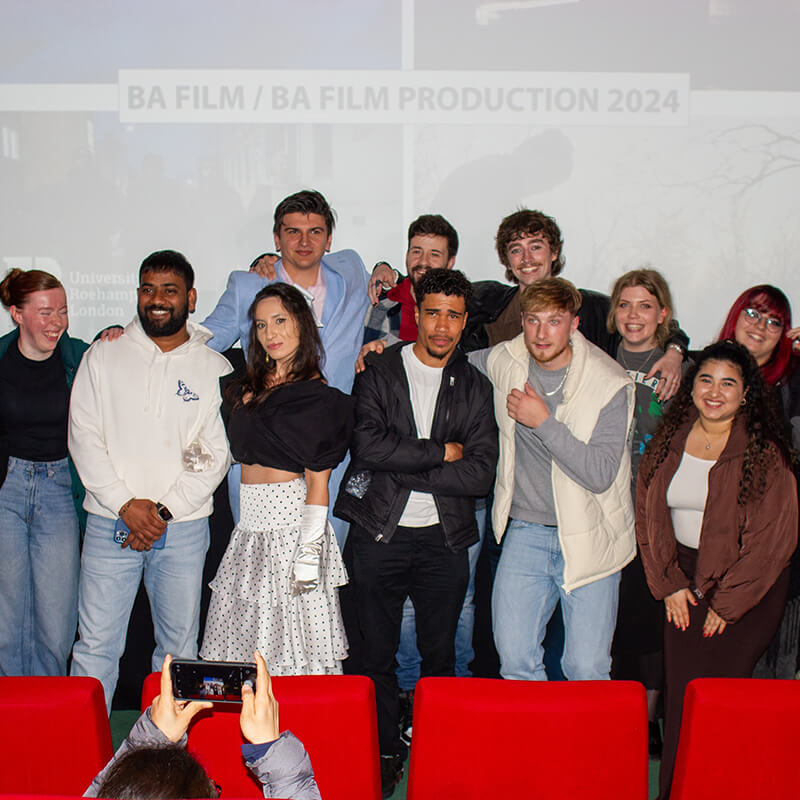
The Student Futures team is here to support you throughout your time at Roehampton and beyond.
They offer services tailored to your needs, helping you take confident steps towards your future.
You’ll have access to a wide range of career workshops and events, where you can engage with employers and develop the skills you need to succeed in the workplace.
These opportunities will help you build your CV, prepare for interviews, and connect with successful Roehampton graduates who are thriving in their careers. You’ll also be able to engage with our partners across London and beyond.
Wherever you want to go in the future, you'll be preparing for the world of work from your very first day.
Learning and assessment
How you'll learn
Experience a dynamic, contemporary curriculum in state-of-the-art facilities.
Working closely with your fellow students, you’ll master filmmaking and problem-solving through:
- Courses structured like real productions with industry challenges
- Collaborating creatively with a close-knit community of students,
- Developing specialisms in directing, writing, producing, cinematography, editing and sound design
You will collaborate on live projects alongside industry experts, mastering both the technical intricacies and artistic nuances necessary to curate a professional portfolio tailored precisely to your career aspirations.
Professional film equipment and studios
Our film production facilities mirror the standards of professional film sets.
- You’ll work with ARRI, Blackmagic and Sony cinema cameras, using XEEN Primes, Zeiss Compact Primes, wireless follow-focus systems, and Teradek wireless video transmission.
- Our lighting kit includes Aputure 600x, Nova P300c, F22c, Astera Titan Tubes, ARRI fixtures, and a full range of accessories that support both studio and location shoots.
- We offer 2 main film studios, 2 sound studios, 11 editing suites (including 4 dedicated colour-grading suites), a 5.1 surround-sound mixing suite, and numerous shooting locations across campus.
Access to BFI Player, Adobe Suite, and Industry Experiences
- Unlimited Access to BFI Player
All Roehampton students receive free access to BFI Player, an extensive library of British and global films. This is a hugely valuable resource, especially for Film students, enhancing coursework, research, and personal exploration in cinema - all at no cost. - Adobe Creative Cloud Access Anytime, Anywhere
All students at Roehampton can access the full Adobe Creative Cloud suite, both on campus and at home. With tools like Photoshop, Illustrator, and Premiere Pro, students have everything they need to excel in media, design, and creative projects, whether in class or remotely.
- Collaborate Across Creative Disciplines
You’ll also have the opportunity to work alongside students from Dance, Digital Design and Journalism through creative cross-disciplinary modules which offer essential knowledge for working in the cultural industries. - Field Trips and Placements
With chances to visit high-profile film festivals and enjoy numerous field trips in London, as well as credited work placement at a variety of media, film, TV, and arts organisations, we produce students whose work connects with wide and diverse audiences.
How you'll be assessed
Push yourself further with real-world assignments.
You’ll be set authentic assessments, meaning that your projects, tasks and exercises will replicate the working world of film production, ensuring that you are fully prepared for life after graduation.
Between Years 2 and 3, you can also opt for a professional placement year, meaning you can apply for a placement and gain valuable career experience.
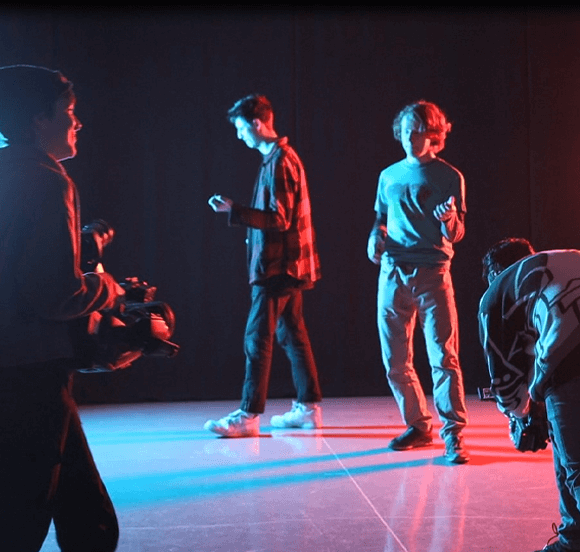
Course Staff
Open days
Get a real taste of our campus, community and what it’s like to study at Roehampton
Applying
Full-time UK undergraduate students apply through UCAS.
Entry tariff
112–128 UCAS points (or equivalent)
Foundation Year: 64–80 UCAS points (or equivalent)
Looking to work out your UCAS points or find out about our entry requirements? Find out more.
When we consider applications to study with us, we form a complete view of your achievements to date, and future potential, and can offer flexibility in entry requirements. Find out more about our Contextual Offer scheme.
General entry requirements
International undergraduate students apply through our direct application system.
Entry tariff
112–128 UCAS points (or equivalent)
International Foundation Pathway:
64 UCAS (or equivalent)
IELTS: 5.5
Looking to work out your UCAS points or find out about our entry requirements? Find out more.
When we consider applications to study with us, we form a complete view of your achievements to date, and future potential, and can offer flexibility in entry requirements. Find out more about our Contextual Offer scheme.
General entry requirements
Fees and funding
UK students
Tuition fees
| Entry date | Undergraduate Year 1 | Undergraduate Foundation Year |
|---|---|---|
| September 2026 | £9,790 | £9,790 |
Prices shown are for the first year of your degree.
Funding your studies
We also provide other ways to support the cost of living, including on-campus car parking, hardship support and some of the most affordable student accommodation and catering in London.
International students
Tuition fees
| Entry date | Undergraduate Year 1 | Undergraduate Foundation Year | International Foundation Pathway |
|---|---|---|---|
| September 2026 | £17,628 | £17,628 | £17,628 |
| January 2027 | – | – | £17,628 |
Prices shown are for the first year of your degree.
Funding your studies
We also provide other ways to support the cost of living, including on-campus car parking, hardship support and some of the most affordable student accommodation and catering in London.



